90% of New Yorkers support changes to take mentally ill off streets, subways: poll
Will Progressives Continue to Refuse Changes to the No Bail Law to Allow r Involuntary Commitment for the Violently Mentally Ill - Pay Attention to Who You Elect as Your Representives in Albany
It’s inhumane NOT to move ahead with involuntary commitment of the worst-off mentally ill Mayor Adams
Nearly 90% of New York City voters support expanding involuntary commitment and care of mentally ill residents roaming the streets or the subway, according to a new poll. The findings from the Association for a Better New York showed a staggering 88% of voters supported expanded treatment — as Gov. Kathy Hochul’s bid to expand the involuntary commitment laws is facing some resistance in the legislature.
More than nine in 10 voters (91%) also agreed with the statement that “it is more compassionate to provide involuntary treatment and care for people with severe mental illness than it is to leave them on the streets” — including a majority (53%) who strongly agree with that statement. Similarly, 91% of voters agree that “people struggling with severe mental illness should not be denied life-saving psychiatric care because their illness prevents them from recognizing that they need help” — including 59% who strongly agree. About nine in 10 voters believe it should be a top or high priority of New York State lawmakers to address untreated severe mental illness, the poll showed. Nearly-two thirds of respondents said they have felt endangered while riding the subway or bus due to the actions of someone grappling with severe mental illness.
Despite overwhelming public support, Hochul is facing some headwinds in Albany. The state Assembly and Senate either entirely omitted or scrapped parts of Hochul’s bid to expand involuntary commitment laws in separate counter proposals to the governor’s budget plan released last week. The lower chamber’s one-house budget proposal omits Hochul’s proposal around expanding the necessary criteria to compel mentally ill people into psychiatric care. But it includes provisions for strengthening hospital discharge planning and requiring review panels after serious incidents where mentally ill people fall through the cracks or harm others. Many mental health care advocates and civil activists also oppose forced treatment, but others including Assembly Speaker Carl Heastie said there could be room for acceptable compromise.
250 Days After Jordan Neely’s Tragic Death, No Accountability by the City or State for $40 Billion NY Spends on Mental Health
Despite the passage of 230 days since the death of Jordan Neely—a mentally ill man failed by every safety net—the New York City Council and State Legislature have yet to hold a single hearing examining why the $40 billion New York spends annually on mental health care failed to save him. Neely’s tragic case underscores a systemic failure, raising urgent questions about whether the state’s mental health funds are being squandered on ineffective treatments and bureaucratic inefficiencies.
This lack of oversight is particularly troubling given the growing crisis of untreated mental illness in New York, which affects not only vulnerable individuals like Neely but also public safety and quality of life. Without a thorough investigation into how mental health dollars are being allocated and whether programs are delivering meaningful outcomes, the cycle of neglect, homelessness, and incarceration will persist. It’s time for lawmakers to confront the inefficiencies within New York’s mental health system and ensure that resources are directed toward effective, evidence-based solutions that save lives.
Updates: A look inside Creedmoor, as the state seeks to expand involuntary commitments Blood on their hands Deranged alleged killer of 14-year-old NYC boy slipped through cracks despite ‘red flags’ — with broken mental health laws to blame LISA: Mental health commissioner defends Hochul’s push to expand involuntary commitment… NY Democrats want MORE crazy people left roaming the streets and subway Who Decides When a Homeless Person Needs to Be Taken Off the Street? New York City’s involuntary removal policy was supposed to make it easier to help mentally ill homeless people get the care they need. In practice, it has raised impossible questions. State lawmakers hesitant to give Hochul green light on mental health priorities Get real in handling New York’s dangerous, mentally-ill street homeless A 14-year-oldWho Decides When a Homeless Person Needs to Be Taken Off the Street? boy Caleb Rios, fatally stabbed on a Bronx corner on his way to school was the victim of a random attack committed by a mentally ill man with an established criminal history, NYPD officials said Saturday. Gov. Hochul looks to expand forced hospitalization as Albany returns to session Adams unveils $650M plan to help mentally ill, homeless New Yorkers Adams’ mental-health efforts are hopeless without involuntary-commitment changes POLITICO NGO: Among New York Democrats, a broader embrace of involuntary hospitalization… Council Member Tiffany Cabán hits Hochul, Adams over controversial mental health, involuntary commitment policies… Homelessness in NYC at a record high despite decrease in migrant population: report
Laws that need to be to help the mentally ill:
1) finally bring sanity to New York’s rules for involuntary commitment (including to inpatient treatment, that is mandatory hospitalization) and 2) make it easier to petition for mental-health treatment under Kendra’s Law. 3) Kendra’s Law, now set to sunset in 2027, permanent — as well as at last amending the no-bail law to include a “dangerousness” standard similar to 49 other states’.
Jordan Neely (December 18, 1992 - May 1, 2023) 230 Days Ago
Mental Illness
Jordan Neely’s life tragically spiraled into mental illness following the brutal murder of his mother more than a decade ago. The devastating loss marked the beginning of a long, painful struggle with mental health issues. On January 24, 2013, officers found Jordan on West 145th Street, disoriented, complaining of numbness, and hearing voices. He was voluntarily committed to Mount Sinai Morningside for treatment. In January 2016, he was hospitalized again after telling police he was suicidal. Eight months later, he was admitted for a third time after police responded to complaints of an angry, intoxicated man threatening people near West 168th Street. Over the years, Jordan was in and out of Bellevue Hospital, cycling through a system ill-equipped to address the root causes of his struggles. His story is a poignant reflection of the failures in mental health care and social support systems for those in crisis.
Neely’s Jail and Police Run-ins
Jordan Neely experienced 42 police run-ins over the years, marked by repeated encounters with the law. Sometimes he was admitted to medical facilities, other times brought to shelters, but the underlying issues remained unresolved. At the time of his death, he was known to New York City police as a troubled drifter, often making violent threats, including to kill his grandfather. His aunt, desperate for help, recalled, "I was crying out for medical help for my nephew—but everything was about insurance." In February 2019, Jordan asked for psychiatric help, telling officers he was hearing voices. His criminal history also included a 2021 incident where he punched a 67-year-old woman in the head, causing her to fall and suffer a broken nose, a fractured orbital bone, and significant bruising and swelling. He was incarcerated for over a year as a result. Jordan's mental health struggles continued. In March 2020, he was admitted to Bellevue Hospital for a psychiatric evaluation after being found disheveled and wandering on a train platform. He had been off his medication for months. During the height of the COVID pandemic, the Citywide Mobile Crisis Outreach Team located him four more times. Though he accepted help from the Bowery Residents' Committee, his situation continued to deteriorate. In late 2021, Neely was incarcerated at Rikers Island from November 17 to February 9, after pleading guilty to second-degree assault. A warrant was issued for his arrest in February 2023, though details of the case were not immediately available. Neely’s repeated run-ins with the law highlight the deep flaws in the system’s response to mental illness, with limited support for his ongoing medical and psychological needs.
Will Elected Officials Who Promised to Fix NYC Mentally Ill Safety Net Now be Blamed for the Death of Jordan Neely?
VERDICT IS IN: Marine veteran Daniel Penny was found not guilty of criminally negligent homicide just days after the top charge, second-degree manslaughter, was dropped after jurors remained deadlocked. Follow developing details.
The Jury Said No to DA Bragg
The jurors in the Perry acquittal prove once again the disconnect between the values of the people versus the values of the people they elect to high office. Penny verdict notwithstanding, never forget Alvin Bragg is an utterly terrible person hellbent on establishing double standards, undermining rule of law, and generally destroying New York.
The father of Jordan Neely spoke to a crowd outside the Manhattan courthouse where a jury acquitted Daniel Penny of criminal wrongdoing in the chokehold death of his son on a crowded subway. Andre Zachery, who is now civilly suing Penny, said the verdict “hurts,” adding “I miss my son.”
Neely had an extensive criminal record, including 42 arrests on charges including petty larceny, jumping subway turnstiles, theft, and three unprovoked assaults on women in the subway between 2019 and 2021. Jordan Neely had long history of mental health issues before tragic NYC subway death. Jordan Neely, at the time of his death, was not only essentially a fugitive but also on the City list of top 50 homeless vagrants with psychiatric issues in the public realm. This is a list maintained by a task force of city agency workers and social-service "nonprofits".
Nicole @nicolegelinas: Throughout this trial, we have never seen a picture of the living Jordan Neely. Let us remember that a promising young man lost his life due to New York State and City's failure to heed multiple warnings over a decade (criminal and mental health) that he wasn't OK. RIP.
William Rapfogel @WRapfogel Jordan Neely's death is a tragedy more of the making of State & City failures too worried to take people like him off the streets for treatment.
The City of New York has spent $27.7B on homelessness since 2015 and hasn't ended homeless in New York much less all of America.
As Political Promises Fade . . .
January 15, 2022, Michelle Go, a 40-year-old Asian American woman, tragically lost her life when she was pushed in front of an oncoming New York City subway train at the Times Square station. The individual responsible for this senseless murder, Martial Simon, was a product of the city's broken mental health system—trapped in a vicious cycle where individuals with severe mental illness are shuttled between psychiatric hospitals, Criminal courts, jails, and the streets.
Almost three years after Michelle’s murder, on November 18, 2024, Ramon Rivera went hunting on the streets of the city to kill three more New Yorkers. Rivera, like Michelle’s murderer and hundreds of others, are trapped in NY’s mental-illness deadly turnstile: hospitals, courts, jail, and wandering the streets turnstile. Starting at 8:22 am in the Chelsea neighborhood, Rivera fatally stabbed Angel Gustavo Lato Landi, an immigrant construction worker who raised his sister Berta after their mother died. Just two hours later, at 10:27 am, Rivera murdered Chang Wang, an Asian businessman fishing in the East River near the Water Club, causing him to bleed out his life. The final victim, Wilma Augustin, a migrant mother of an eight-year-old, living in a midtown shelter was attacked and fatally stabbed near the UN building at 10:55 am.
Since the initial reports of Rivera's triple murders on November 18th, there have been no follow-up media stories. In contrast, after Michelle’s tragic 2022 murder, extensive follow-up coverage followed, largely driven by the Asian-American community and Michaelle’s friends who organized the Times Square memorial service. During this event, politicians gathered and made public pledges to address the state's failing mental health system which wastes billions in government funds every year. These promises, however, have largely gone unfulfilled, highlighting a stark contrast in the media’s response to these two tragedies.
NY’s Mental Health Failure That Killed Michelle Continues Despite Michelle’s 2022 Memorial Political Promises
In a poignant New York Times Op-Ed, Justin Go, Michelle’s father, shared the profound grief his family endured due to the prolonged legal process surrounding his daughter’s killer and his mental state. He called Michelle’s death and the Times Square memorial service where his daughter’s picture was emblazoned on an electronic billboard for the world to see" on January 18, 2022, “a call to action to fix New York’s mental health system.”
Three years ago, Congresswoman Grace Meng, who hosted Michelle's Times Square memorial, passionately stated, “We need to make sure we are working to get justice for Michelle.” U.S. Senator Chuck Schumer, in a message read by Meng, echoed the need for action: “Nobody deserves to feel unsafe when they are on the subway or walking the streets. I will continue working with my colleagues to make NYC a safer place for everyone.”
City Council Speaker Adrienne Adams urged that Michelle’s death must drive urgent change, stating, "The legacy of her death must push us forward to address the gaps that led to such a tragedy." Manhattan DA Alvin Bragg, also at the memorial, announced a $9 million initiative to break the cycle of mentally ill New Yorkers cycling through the justice system without proper treatment. New York State Attorney General Tish James, speaking at the event, demanded immediate action, saying, “We have people on the street who are a danger to themselves and others. It is time for urgent actions.” James also called for the restoration of the thousands of psychiatric hospital beds cut by the state over the last decade. Congressmen Jerrold Nadler and Goldman sponsored the Michelle Alyssa Go Act, which aimed to increase the number of Medicaid-funded psychiatric beds in the city. Unfortunately, the bill failed to pass in Congress. State Senator Brad Hoylman-Sigal and Manhattan Borough President Mark Levine called on the broke MTA to spend billions to install train gates on subway platforms to prevent riders from being pushed onto the tracks.
Lander’s Reliance on Nonprofits for Political Power Has Wasted Billions on Failed, Ineffective Fixes for NY’s Mental Health Crisis
Former NYC Mayor @BilldeBlasio gave his wife $1.5 billion of tax payer $$$ to end the homeless crisis in NYC. Homelessness in NYC has hit all-time highs. DeBlasio’s wife has never had to prove what those funds were spent on. Jordan Neely was schizophrenic and homeless—the funds were allocated to help him. The City Council Should be holding hearing on why ThriveNYC did not help Jordan Neely.
NYC Comptroller Brad Lander, who spoke at Michelle Go’s memorial service, claimed an increase in government funding to community-based organizations (CBOs) was the solution to New York’s mental health crisis. Lander, was elected with significant support from volunteers and contributions from board members of Brooklyn’s Fifth Avenue Committee—a government-funded nonprofit he ran until he ran for the council—the City Controller, like most elected officials use CBOs as political tools to obtain or get reelected to a political office, in clear violation of well-established IRS Rules that prohibit political involvement of not-for-profit organizations.
The Same Park Slope nonprofit that helped Lander win a City Council election in 2009 is now his wife’s nonprofit client along with hundreds of other government-funded groups. For Lander, these nonprofits are not just community resources, they operate for politicians like political clubs in their quest for higher office, including Lander’s ambitions to become the next NYC Mayor.
Lander’s actions highlight a disturbing pattern of prioritizing his political career over his promises to address New York’s mental health crisis. Despite vowing to honor Michelle’s memory by reforming the state's failing mental health deadly emergency, Lander has failed to hold former Mayor de Blasio and his wife, Chirlane McCray, accountable for the financial mismanagement of the ThriveNYC initiative. As Comptroller, Lander had the authority to audit McCray’s program, which was supposed to address the city’s mental health failures, but he chose not to act. An audit would have exposed how ThriveNYC became a vehicle for political patronage, funneling taxpayer money into nonprofits that supported de Blasio’s re-election campaign, rather than effectively addressing the mental health crisis. Jewish Voice, Jan. 2022: The City’s Non-Profit Political Complex Has Recklessly Spent Billions on the Homeless Who Still Occupy Our Streets and Subways
By not conducting an audit of ThriveNYC, Lander effectively gave a free pass to the progressive leaders in the NY City Council and Albany, who continue to funnel government funds into these misused nonprofits while also blocking necessary reforms, such as changing the bail law to allow judges to commit the violent mentally ill to hospitals. A thorough audit would have revealed that these nonprofits are not solving the city's mental health disaster and are failing to prevent horrific crimes committed by individuals trapped in the cycle of hospitals, courts, jails, and the streets. Lander’s refusal to hold ThriveNYC accountable has also suppressed important discussions and media coverage on the need for reforms supported by organizations like the New York State Psychiatric Association, the National Alliance on Mental Illness, the Mental Health Association of New York City, and the mayor’s office all of which advocate for empowering judges to involuntarily commit those with severe mental illness, particularly when they pose a danger to public safety.
Controller Brad Lander, Congressman Jerrold Nadler, Manhattan Borough President Mark Levine, State Senator Brad Hoylman-Sigal, and Councilmember Erik Bottcher—all of whom attended Michelle's memorial and pledged three years ago to address the state’s broken mental health system—are staunch opponents of bail law reforms. Their November 21 letter calling for an investigation by the Department of Correction, Department of Homeless Services, and Health + Hospitals of the Rivera killings, comes across as a disingenuous attempt to cover their tracks, rather than taking responsibility for their failure change the bail law to allow judges to institutionalize the criminally mentally ill. These same representatives represent districts where Rivera, trapped in the same vicious cycle of psychiatric hospitals, courts, jails, and the streets as Michelle's killer, Simon, resides. Rivera's brutal murder of three New Yorkers—including an immigrant construction worker, a fishmonger, and the mother of an eight-year-old child living in a migrant shelter—was met with no memorial, no political promises, and little media coverage, aside from a brief mention the day after the murders. It wasn’t until Congressman Richie Torres publicly criticized the governor and mayor for their inaction that the issue of mental health reform gained any real attention.
With Progressives Refusing to Change the Bail Law, Only a Federal Takeover of the City's Mental Health System Will Stop the Killing
Progressives blocking vital changes to the bail law to allow judges to institutionalize the violently mentally ill are now pushing hard for a federal takeover of Rikers Island as part of their efforts to reduce prison populations in the city. It's time that common-sense New Yorkers take a page out of the left-winger’s playbook and demand that President-elect Trump newly appointed U.S. Attorney General Pam Bondi take charge of the city's and state's failing mental health system. The newly appointed U.S. Attorney for the Southern District Jay Clayton has the ability to spearhead efforts to use the federal courts to institutionalize the 1,000 to 2,000 dangerously mentally ill individuals trapped in the deadly turnstile of psychiatric hospitals, courts, jails, and the streets. If progressive leaders in City Hall and Albany continue to refuse funding to reopen essential mental health facilities—such as parts of Queens' Creedmoor Psychiatric Center, Bayley Seton Hospital on Staten Island, and Pilgrim Psychiatric State Hospital in Suffolk County—the federal government should redirect Medicaid funding intended for the city and state until they take decisive action to end this crisis. The Trump Justice Department, along with Musk’s DOGE government auditors, should collaborate to recover the missing funds from de Blasio’s wife’s ThriveNYC initiative and other mismanaged nonprofit expenditures, redirecting those resources to expand psychiatric hospital beds to properly address the city’s mental health crisis.
The Nonprofit Industrial Complex
SHOULD THE BOWERY RESIDENT'S COMMITTEE BE HELD LIABLE FOR THE DEATH OF JORDAN NEALY?
Reza Chowdhury @RezaC1 The Bowery Resident's Committee is "a provider of housing and services for individuals experiencing homelessness". They are one of the "nonprofit" social service providers that had 71. In 2023 alone, they had multiple contacts with Neely after he absconded from his taxpayer funded alternative to incarceration and before his demise. A warrant had been issued for Neely's arrest but BRC does not believe in cooperating with law enforcement. "But outreach workers don’t like the police and are not inclined to work with them, so when BRC encountered Neely twice in March, he wasn’t turned in". They had another at least another two encounters. During one of these instances, Neely exposed himself and urinated in the train. The outreach worker noted "He could be a harm to others or himself if left untreated." BRC receives $160M+ per year in taxpayer funding, which has grown exponentially since the De Blasio administration. If individual like Neely are incarcerated, their opportunity to monetize is reduced across not only its street outreach efforts but also for shelter services funding. The New York State Comptroller issued a scathing report about the taxpayer funding that was being provided to BRC back in 2020 with minimal utility. BRC is just a small cog in the $4B annual homeless industrial complex, wrapped into the tens of billions of spending for "social services" that don't seem to deliver results efficiently and effectively.
How Albany and the Nonprofits Stigmatize the Mentally Ill and Trapped the Mayor in NY’s Dysfunctional Politics
Updates
Mayor Adams calls for the 'involuntary removal' of people who are 'a danger to others' on the streets 11/22/24
Adams addressed a recent deadly stabbing by a mentally ill homeless person

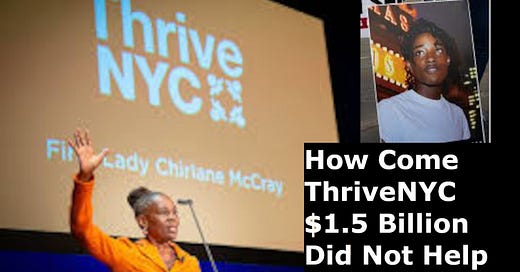


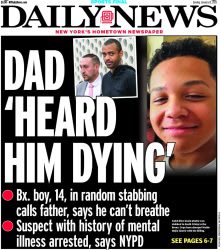


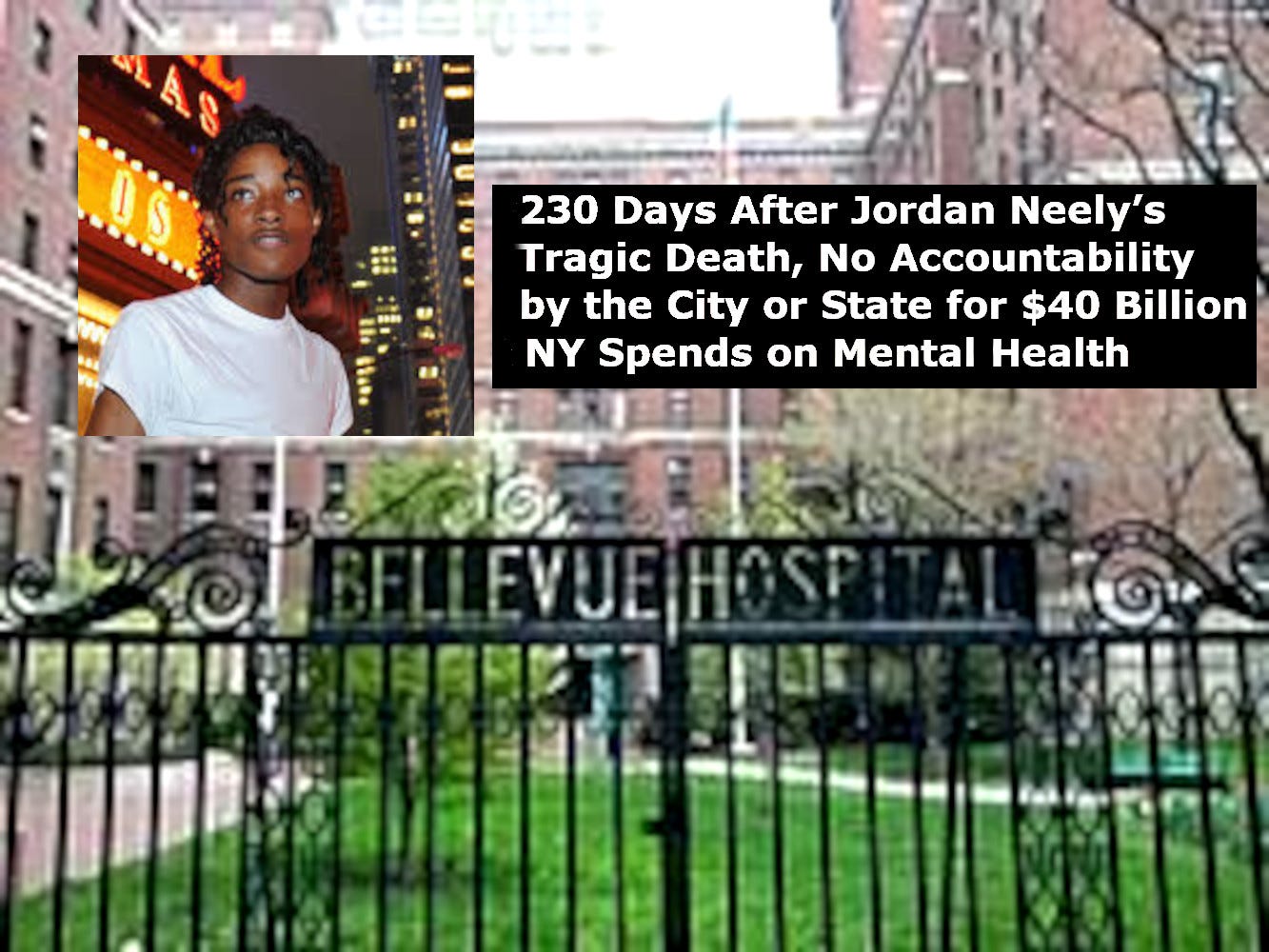
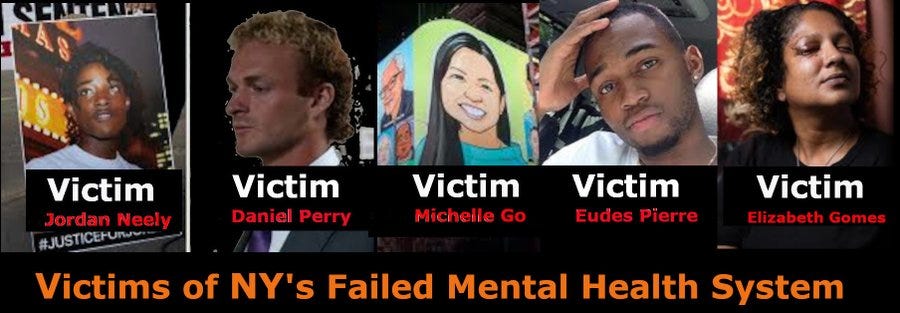
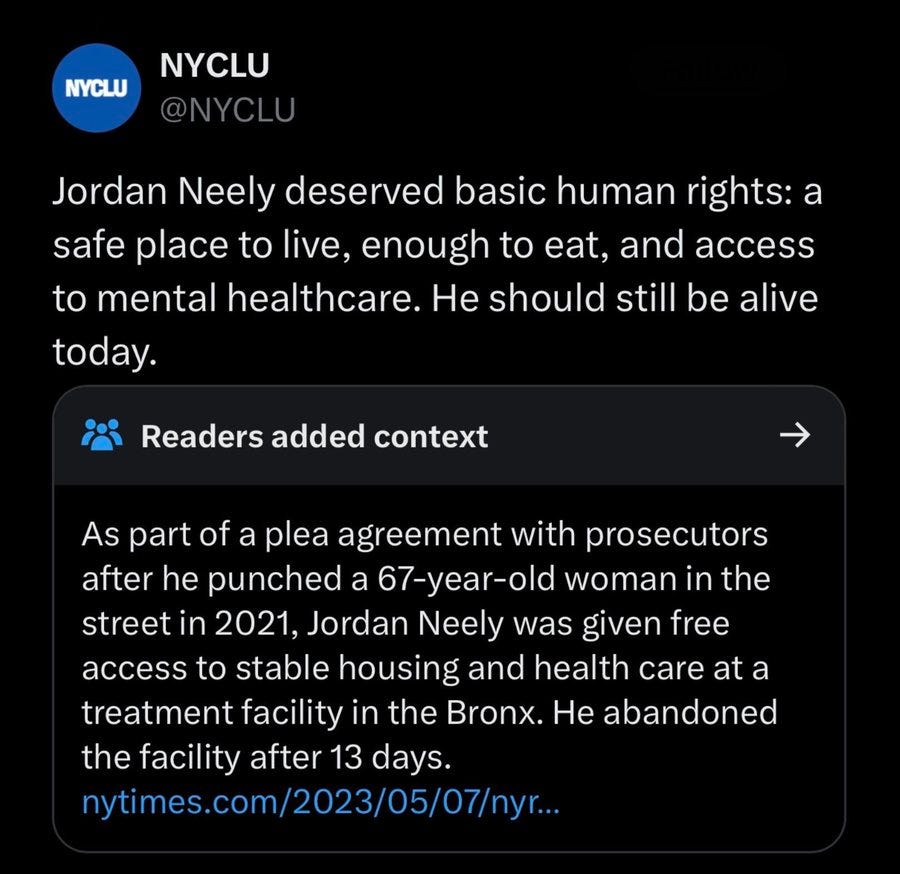
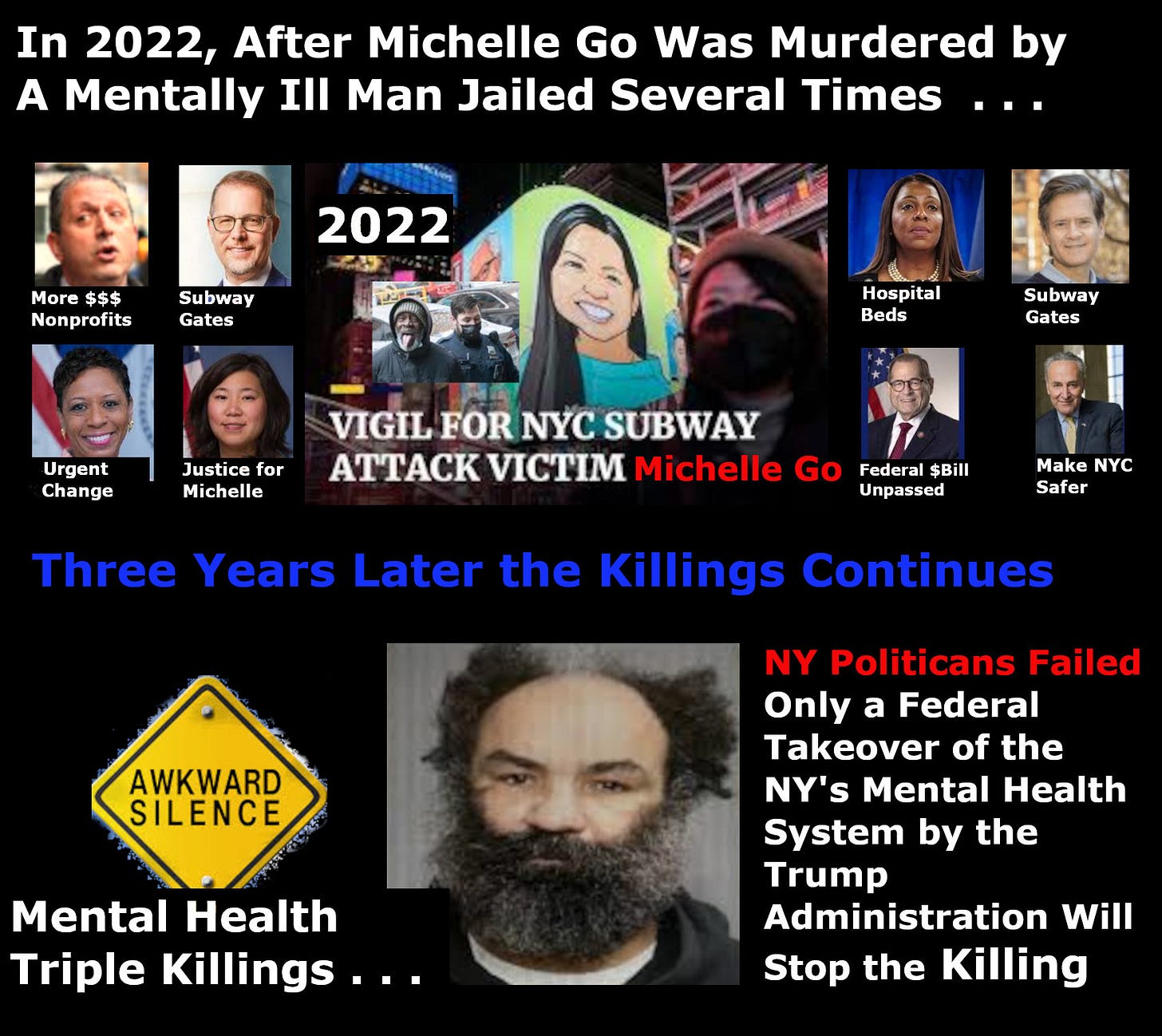
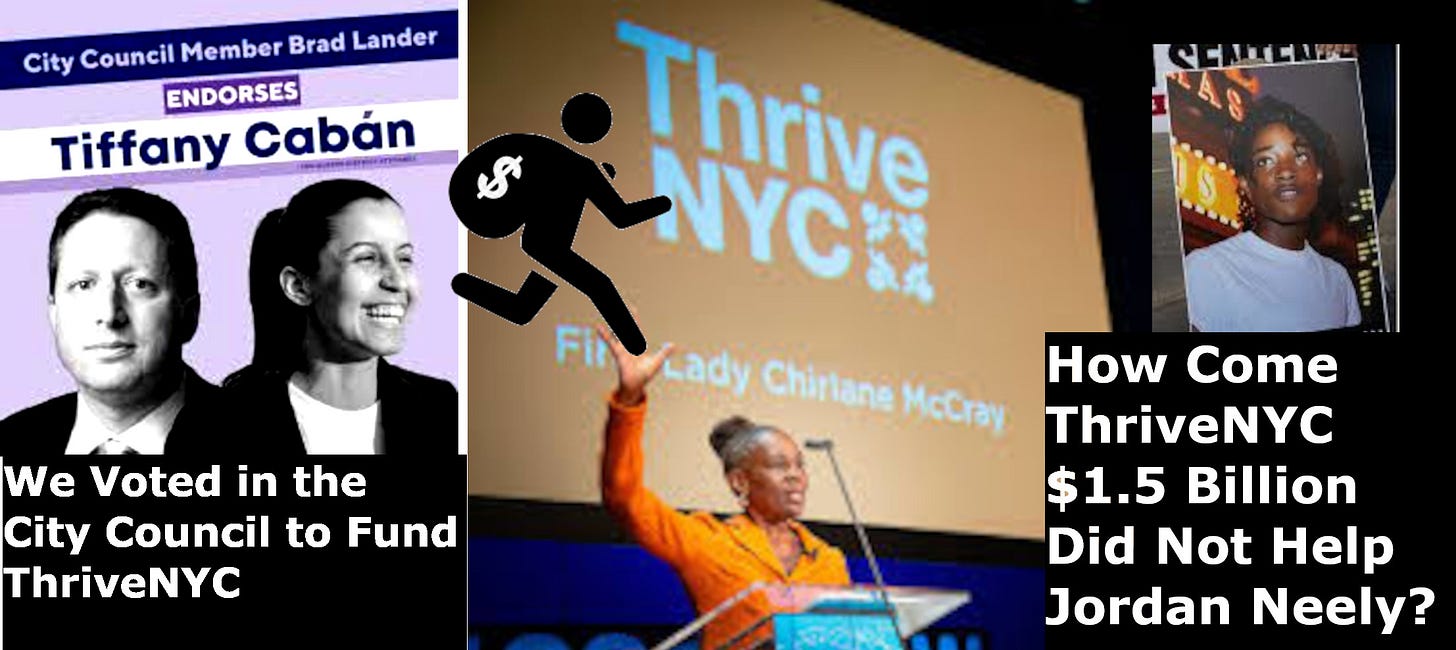

Only Gary Tilzer reports the “True News” and knows the background info to make these obvious connections that are continually overlooked, under reported or just swept under the rug and not reported by the main stream media.?